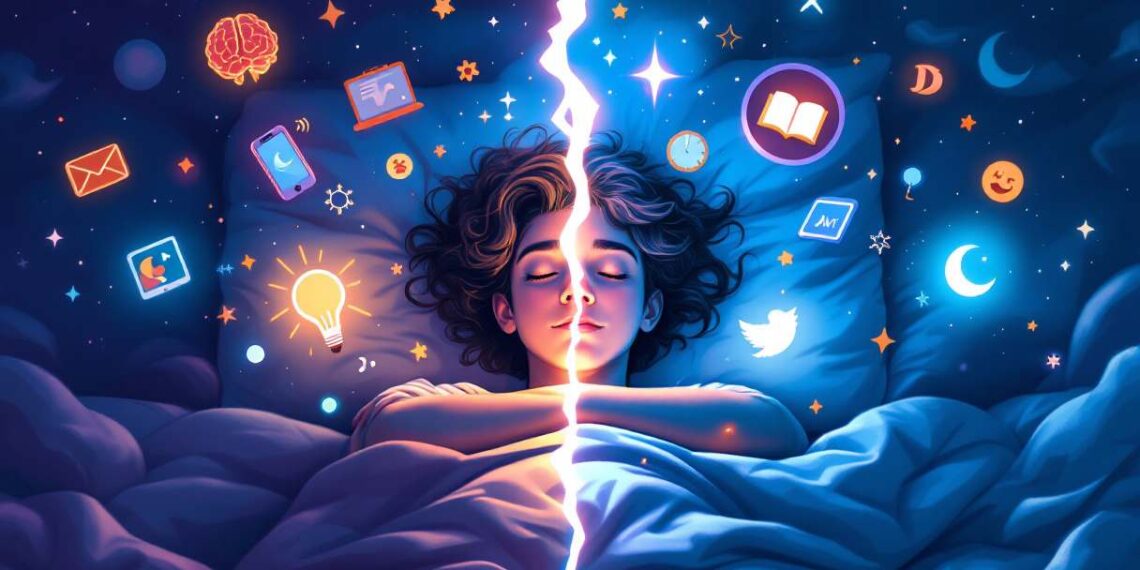Ever wondered why your teenager can sleep until noon on weekends but can barely keep their eyes open during the first period? Welcome to the fascinating world of teenage sleep, where biology meets modern life in an epic battle for rest. It’s not just about being “lazy” – teenage sleep is a complex dance of hormones, habits, and heightened needs that can make or break their success in everything from academics to athletics.
Whether you’re a concerned parent watching your teen burn the midnight oil, or a teenager wondering why you’re always tired, understanding the science of sleep could be the game-changer you need. Let’s dive into why those precious hours of shut-eye matter more than you might think.
Why Sleep Matters
Sleep is like the unsung hero for teenagers’ well-being. It’s got a big role to play in keeping health in check and is something parents, caregivers, and teens should all have a grasp on.
What Good Sleep Habits Look Like
Getting into good sleep habits is like giving your health a big ol’ boost. When you catch those Z’s, your body gets to patch itself up and your noggin gets time to make sense of everything you’ve learned. If you start practicing these habits early, you’re setting yourself up to feel a whole lot better down the line.
| Good Sleep Habits | What’s That About? |
|---|---|
| Sticking to a Sleep Schedule | Hitting the sack and rising with the roosters at the same time keeps your body clock in sync. |
| Creating a Chill Zone | A room that’s cool, dark, and quiet is the jackpot for a good night’s sleep. |
| Ditching the Screens | Cutting screen time before bed sets you up to doze off more easily. |
For the lowdown on how gadgets mess with sleep, don’t miss our piece about screen time and sleep.
“Sleep is the golden chain that ties health and our bodies together, and is most crucial during the teenage years of rapid development.” – Dr. Matthew Walker
Sleep’s Role in Teenage Years
Teens need their sleep, no joke! Those years are packed with body changes and brain developments. If sleep gets skimped on, it can cause some serious problems like forgetting stuff, mood swings, and grades taking a dive.
| How Lack of Sleep Shows Up | What’s Going Down? |
|---|---|
| Brain Freeze | Sleep loss can mess with memory, concentration, and decision-making. |
| Mood Swings | Less sleep could mean more grumpiness and stress. |
| Health Hazards | Not getting enough sleep over time might lead to issues like extra pounds or diabetes. |
Knowing why sleep’s so important can give teens a nudge to make it a priority. For ideas that fit all ages, have a peek at our stuff on college student sleep tips and baby sleep patterns.
Grasping and building good sleep habits can really set the stage for a better quality of life and help fend off the effects of skimping on sleep during teenage years.

Understanding Teenage Sleep Deprivation
Sleep deprivation isn’t just about yawns and cranky mornings—it’s shaking things up for teenagers in some real ways. Let’s break down why they’re not catching enough Z’s and what that means.
“The biggest sleep challenge for teenagers isn’t laziness – it’s biology working against society’s expectations.” – Dr. Mary Carskadon
What’s Messing with Teen Sleep?
Teenagers are juggling a lot, and their sleep’s often where it takes a hit. Check out some of the usual suspects keeping them from dreamland:
| Culprit | What It’s Doing |
|---|---|
| Academic Pressure | Piling on the homework means more late nights hitting the books. |
| Social Life | Sports, clubs, and hanging out are squeezing sleep out of the schedule. |
| Gadget Time | Too much screen action before hitting the hay makes it harder to snooze. |
| Body Clock Tweaks | Teens are wired to feel sleepy later, thanks to biological shifts. |
| Stress and Worries | Trouble nodding off or staying asleep often stems from stress and anxiety. |
Tech’s a biggie here. Need help? Our screen time and sleep article dishes out handy tips!
What Happens Without Enough Shut-Eye?
Not sleeping enough doesn’t just make teens groggy; it messes with their mind and body. Here’s the lowdown:
| Effect | What’s Happening |
|---|---|
| Foggy Brain | Concentration dips and memory’s on the fritz. |
| Mood Swings | More sass and tears—irritability, anxiety, or feeling blue pop up. |
| Health Hits | Skimping on sleep can pack on pounds and zap the immune system. |
| School Struggles | Tiredness drags down grades and focus. |
| Risky Moves | Sleepy teens might take more chances they wouldn’t usually consider. |
Need a game plan for better sleep? Look into our college student sleep tips for ideas that could help anyone looking to improve.
By wrapping their heads around what steals sleep and how it backfires, teens and parents can team up to find better sleep routines and feel more rested.
Sleep Needs by Age Group
To keep the nap monsters away and ensure everyone’s snoozing happily, it’s good to know how sleep needs change as we grow up. Let’s chat about how much shut-eye teenagers should be getting and how it differs from other age groups.
Recommended Sleep Durations for Teenagers
Oh, those teenage years, filled with growth spurts, homework, and endless drama. Teenagers (14 to 17 years old) are like sleep sponges, needing about 8 to 10 hours of zzz’s each night to handle their rapid growth and busy minds. Catching enough sleep not only boosts mood and brainpower but also gives overall health a high-five.
| Age Group | Recommended Sleep Duration |
|---|---|
| 14–17 years | 8–10 hours |
| 11–13 years | 9–11 hours |
| 6–10 years | 9–12 hours |
| 3–5 years | 10–13 hours |
| 1–2 years | 11–14 hours |
| Newborns | 14–17 hours |
Teenagers skipping their sleep need might find themselves dealing with teenage sleep deprivation, which can mess up their school life and make them cranky.
Variances in Sleep Needs Across Different Age Groups
As we wade through the journey of life, our snooze requirements mix it up a bit. Keeping track of these changes is a must for parents and caregivers to nurture healthy sleep habits.
| Age Group | Sleep Needs |
|---|---|
| Newborn (0–3 months) | 14–17 hours |
| Infant (4–11 months) | 12–15 hours |
| Toddler (1–2 years) | 11–14 hours |
| Preschooler (3–5 years) | 10–13 hours |
| School Age (6–13 years) | 9–11 hours |
| Teenager (14–17 years) | 8–10 hours |
| Young Adult (18–25 years) | 7–9 hours |
| Adult (26–64 years) | 7–9 hours |
| Senior (65+ years) | 7–8 hours |
Getting a grip on these sleep needs can help tackle any nighttime hiccups. For teenagers, especially, parents should watch for things like exam stress or too much screen time that can mess with sleep patterns. Healthcare whizzes have plenty of tricks up their sleeves to help everyone sleep better and wake up to sunshine and smiles.

Challenges Faced by Teenagers
Ah, teenagers. Those years where you’re old enough to want freedom but young enough to still have a bedtime. Juggling school, social media, and tech gadgets, teens often face hurdles that mess up their sleep. Let’s dive into the top three culprits: school stress, social media addiction, and gadget overload.
Academic Pressure and Sleep
Books, homework, and teachers, oh my! School demands can be overwhelming, turning teens into late-night zombies just to keep up. Midnight oil isn’t just a saying; it’s a nightly reality for many, pushing them into serious sleep loss territory.
| Surveyed Teenagers | Percentage Who Say School Makes Sleep a Distant Dream |
|---|---|
| 1000 teens surveyed | 68% |
Lack of zzz’s makes it tough to concentrate in class, remember stuff, and give their best academically. Here, a call out to parents and teachers: step in, help students prioritize—and remind them sleep’s not just for babies.
Social Media and Sleep Patterns
Here’s a plot twist: social media and sleep are not BFFs. Checking notifications, liking posts, late-night DMs—it’s enough to keep any teen up till the wee hours.
A peek into the scrolling habits:
| Surveyed Teenagers | Average Scrollathon Time Before Lights Out |
|---|---|
| 500 teens surveyed | 2.5 hours |
All this screen time creates a tougher time calming down before sleep. If you’re wondering about the nitty-gritty of this social media-sleep conundrum, check out the effects of screen time on sleep.
Impact of Technology on Teenage Sleep
Now, about tech—it’s both friend and foe. Perfect for learning or chatting, sure, but those screens give off blue light that can give melatonin production a one-two punch, messing with the sleep cycle.
| Factors Messing with Teen Sleep | Percentage of Tech-Smokers |
|---|---|
| Gadgets in a cozy bed | 72% |
| Blue light invasion | 78% |
Say goodbye to the blue nighttime glow: set up “device curfews” or keep tech out of bedrooms altogether—bring on healthier sleep habits! For more deets on sleep strategies, check out college sleep tips.

All said and done, teenagers and adults need to team up—like Batman and Robin—to tackle the sleep-invaders head-on. Understanding the culprits behind sleepless nights can help snatch back those precious hours of slumber.
Solutions for Teenage Sleep Deprivation
Getting those teenagers to actually hit the hay and stay there—it’s like trying to wrangle a herd of cats. But, helping them catch better Z’s is totally doable with some smart moves. Here’s how you can help teens snooze better and wake up ready to take on the day.
Establishing a Consistent Sleep Routine
Teenagers thrive on routine—at least when it comes to sleep! Aim for them to hit the sack and rise at the same times every day. It keeps their body clock ticking along nicely. They typically need 8 to 10 hours of shut-eye to feel human. Regularity is your new BFF for top-notch sleep.
| Age Group | Recommended Hours of Sleep |
|---|---|
| Teenagers (14-17 years) | 8 – 10 hours |
| Young Adults (18-25 years) | 7 – 9 hours |
Want your teen to fall into dreamland like a pro? Encourage bedtime chill-outs like reading (not the must-do homework!), soaking in warm water, or just some gentle relaxation practices. If you’re curious about setting up a snooze routine, peek at our guide on adjusting sleep schedules.
Creating a Sleep-Friendly Environment
Messy rooms and the TV blaring don’t exactly invite a good night’s rest. Here’s how to make a space where sleeping becomes second nature:
- Darkness: Keeping it pitch black can turn the place into a paradise for sleep. Throw in some blackout curtains or pop on an eye mask.
- Noise Control: Silence is golden, or at least very sleepy. A white noise machine or some earplugs could do wonders.
- Comfort: Invest in a comfy mattress and fluffy pillows. Trust me, it’s worth it for those extra Z’s.
Turn the room into a cool haven (think 60°F to 67°F) and watch how much better they sleep. Check out our piece on screen time and sleep for more tricks on setting up a serene snooze environment.
Encouraging Healthy Sleep Habits
To beat the cranky zombie teen epidemic, boost those healthy sleep habits. Here’s what you need to know:
- Limit Screen Time: It’s a no-brainer—less screen action before bed equals better sleep. The blue glow from phones and tablets messes with the sleep hormone melatonin.
- Mindful Caffeine Consumption: Teens chug coffee like it’s water these days, but cutting back in the PM can make drifting off easier.
Getting teens moving during daylight is also a win. Exercise not only tires them out but actually upgrades sleep quality. For age and stage-specific tips, look at our articles on college student sleep tips and toddler sleep regression.
With these sleep-boosting strategies, teenagers can finally get the rest they need to function without the grumpiness. Better sleep means happier, healthier teens ready to conquer whatever comes their way.
Seeking Professional Help
When it comes to sleep-deprived teens, spotting the clues and getting some expert assistance can totally change the game. Tackling these problems early helps kids get into the groove of solid sleep habits.
Recognizing Signs of Chronic Sleep Deprivation
Teen sleep troubles don’t come wearing neon signs, but they do leave hints, both physical and mental. Watch out for these telltale behaviors:
| What to Watch For | What’s Happening |
|---|---|
| Sleeping in Homeroom | Struggling to keep those eyes open in class or during activities. |
| Grumpiness Overload | Waves of mood swings and emotional roller coasters. |
| Brain Fog | Finding it hard to focus on schoolwork or chit-chat. |
| A Dip in Grades | Sudden slide in grades or ditching homework like it’s hot. |
| Eating Weirdness | Craving weird snacks or losing interest in munchies. |
| Health Grumbles | Recurring headaches or constant yawning marathons. |
Spot these and you’ll be able to jump in early, lending a hand to your teen superhero on their sleep journey.

Consultation with Healthcare Professionals for Teenage Sleep Issues
If those sleep red flags aren’t going away, it might be time to chat with a professional doctor. A good one can dish out advice that’s just right for your teen’s needs.
During a pow-wow with a healthcare guru, you might:
- Get a sleep rundown to peek at those Zzz patterns and habits.
- Chat about things like screen addiction, that giant Starbucks iced coffee, or stress storms.
- Look into different ways to tackle sleep dilemmas, like trying out behavioral tweaks.
- Suggest gadgets to keep an eye on when sleep goes sideways. For inspiration on top sleep gadgets, check out our article on kid-friendly sleep trackers.
Jumping into action like this, parents can steer their teens through sleep tests, setting them up for better health and killer grades. More nuggets of wisdom can be found in write-ups on sleep at every life stage, like tips for college crashers’ nap hacks or shifting those sleep gears for a more humane schedule.
Conclusion
Understanding and supporting healthy sleep habits during the teenage years isn’t just about preventing grumpiness – it’s about investing in their future success and well-being. From managing academic pressures to navigating the challenges of social media and technology, teenagers face unique obstacles to quality sleep. But with the right knowledge, support, and strategies, better sleep is within reach. Remember, good sleep isn’t a luxury for teenagers – it’s a biological necessity that powers their growth, learning, and emotional resilience. By prioritizing sleep health now, we’re helping build the foundation for healthier, happier, and more successful young adults.
FAQs
How much sleep do teenagers really need?
Teenagers need 8-10 hours of quality sleep per night due to rapid physical and mental development. This is more than adults need but less than younger children require.
Why do teenagers stay up late and struggle to wake up early?
Biological changes during puberty shift teens’ natural sleep cycle (circadian rhythm) about 2 hours later. This “sleep phase delay” makes it harder for them to fall asleep early or wake up early.
Does sleeping in on weekends help teens catch up on sleep?
While catching up on some sleep debt is possible, irregular sleep patterns can disrupt the body’s natural rhythm. It’s better to maintain consistent sleep and wake times throughout the week.
How does screen time affect teen sleep?
Blue light from devices suppresses melatonin production (the sleep hormone), making it harder to fall asleep. Social media and gaming can also create emotional stimulation that interferes with sleep.
When should parents seek professional help for teen sleep issues?
Consider professional help if sleep problems persist for more than a few weeks, affect daily functioning, or are accompanied by other concerns like anxiety or depression.








